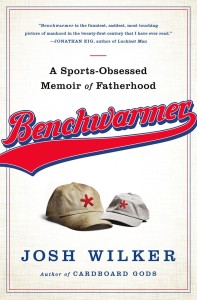My dad owns a baseball signed by a man named Carlton Fisk—once a catcher for the Boston Red Sox. But it’s not his affiliation with the Red Sox which caused my dad to make this purchase—after all, my dad is a life-long Yankees fan, so such a piece of memorabilia treads toward sacrilegious. He has this ball because, as young boys, my dad and Mr. Fisk played sandlot ball together in Vermont.
Unfortunately, my connection to this memorabilia ends there. See—although I highly enjoy taking in a ball game and can still remember Andy Moog as goalie for the Boston Bruins at the original Boston Garden, as well as a love for many sports-related movies from Angels in the Outfield to For Love of the Game, I am not a sports person. I don’t follow any teams or players. While the rest of the state of Colorado is enwrapped in Broncos fever—truly year-round—my only excitement in them clinching a win means I get a free donut the next day at the local grocery store.
Maybe it’s because my history with sports on a personal level is rather dark. In 6th grade, despite practices already having begun, my dad told me to go to the coach and ask to be part of the basketball team. I remember very little about it except that, as a big guy (weight-big as well as height-big), it was excruciating. From having to run Suicides to not knowing “the top of the key” from mid-court, I was way out of my element.
In junior high, during a special day-out at the local ballpark with schoolmates, I was—for whatever reason—stopped while grabbing a drink and asked by an official-looking man if I wanted to be a bat boy that day…for the team that THE Michael Jordan was playing for. I jumped at the chance, not knowing what to expect. Again, I remember very little except for lots of running and a lot of expletive-laced, colorful conversation amongst players. And then there was Mr. Jordan, who made the following comment to me after I ran back to the dugout, sweaty and out of breath: “Sit down, kid, before you lose all those pounds you’ve gained.”
In 9th grade, because of my height and size, I was asked repeatedly by the football coach to come out for the team. I politely turned them all down, but not so much because I knew nothing about football nor shared any enthusiasm for it, but rather because I had much better plans for my time: band. Choir. Drama club. Being my size and not wanting to be a part of the team turned me into a long-running rumor—that, because of this, I must be gay.
So, all-in-all, my experience, on a personal level with sports has been one of little fanfare and fandom.
Enter Josh Wilker’s Benchwarmer.
The book, written in the form of a sports encyclopedia intertwined with the memories of a first-time father is, in a word, exceptional. Epic. Eerie. Eerie because despite the myriad of references to sports figures ranging from the obscure to the legendary, it was like reading my own story as a father. The want to be “discovered” and become someone great only to feel passed over and left with the remnants of a dream. Feeling like a nobody with no way out but through, with all odds seemingly stacked against me. Enduring what seems to be an endless string of losses and wondering if I was meant to do this at all. The want to be the “Next Ryan Leaf,” gone, removed, left alone to simply “be.” All of these instances are told through the stories of sports figures, great and small, relating them—fluidly, if not effortlessly—to experiences as a new father.
While women—my own wife, included—have their support groups, their online forums, their friends and colleagues with whom to commiserate about parenthood and all its triumphs and tribulations, it has been my experience as a father that support is, quite honestly, very little. I’ve asked my wife if kids are discussed at the various Moms Night Out events her friends schedule to which she replies, “Of course!” Even at mixed gatherings we attend, where both moms and dads are present, the dads are often found discussing work or building the new deck or sports.
Sports.
In this manner, being a language spoken by so many men—so many fathers—Benchwarmer speaks volumes. It has the ability to connect, even to a man who doesn’t follow sports. Men do not often stand around discussing their failures as fathers—but they do discuss sports. Josh Wilker takes the language of parenthood and turns it into something recognizable. Tangible. Understandable.
At the same time, Josh Wilker’s memoir may come across to some as dark, depressing, or even brooding. Various mentions of self-loathing riddle the pages. Wanting to leave it all behind finds its way into many memories. The thing about this is it is honest. It’s real. As a parent of two, I have known, first-hand, the struggles that come with parenthood: the late nights, the sleepless ones, the fights, the yearning for—but lack of—slowness and intimacy. These are raw accounts, but they are real. They are–like the sports metaphors used to bring them alive—relatable, recognizable events. This is of the utmost importance because, again, the ups and downs of parenthood are not often discussed by fathers. So while it may not be a co-worker or best friend (and, hopefully, relatable fellow father) on the adjoining bar stool, Wilker’s book becomes the listening ear and the advising friend many dads want, even need, but—for whatever reason—don’t have at hand.
In the movie City Slickers, the character Phil is discussing baseball with his buddies. The sole woman on the cattle drive explains that she doesn’t understand how men can talk ad nauseum about baseball; that, although she likes baseball, doesn’t get how, or why, men keep stats and follow players who may not even still play the game whereas, when with her girlfriends, they discuss “real life.” Mitch says the following:
You’re right I suppose, I mean, I guess it is childish. But when I was about 18 and my dad and I couldn’t communicate about anything at all, we could still talk about baseball. Now that – that was real.
A month ago, at the local thrift store, I found a Yankees sweatshirt. It’s a little smaller than I’d like, but I bought it. I wore it to show my dad. It is, in many ways, an “I’m sorry.” I’m sorry I didn’t play much ball like you did. I’m sorry I played that one season of basketball and never gave returning to it a single thought. More so, it’s a thank you; an I love you. Not that those three words aren’t spoken between us—they are, quite often! But wearing a shirt that exclaims the name of his beloved team, even when I’m not the sports follower he is and always has been is, in many ways, like Josh Wilker’s extraordinary tome, speaking a special language. It is something which, to the casual observer, seems like nothing at all but, between us, means everything.
 Andy Malinski is a writer and speaker from Northern Colorado. Inspired by the home birth of his son (which also included a midwife and birth doula), he created The Dadvocate in 2014 to help dads (and moms) be educated and informed about the many decisions and dynamic changes that come with pregnancy and birth, all the while using humor and raw insight to show the birth world and parenthood from a dad’s point of view. His articles have appeared in such online blogs as the national publication Macaroni Kid and the San Francisco-based Doula Spot, a group for which he acts as co-editor. His inaugural article, “A Man’s Guide To Doulas: Why She Wants One & Why You Should Too” has been viewed and shared via social media over 8000 times, world-wide.
Andy Malinski is a writer and speaker from Northern Colorado. Inspired by the home birth of his son (which also included a midwife and birth doula), he created The Dadvocate in 2014 to help dads (and moms) be educated and informed about the many decisions and dynamic changes that come with pregnancy and birth, all the while using humor and raw insight to show the birth world and parenthood from a dad’s point of view. His articles have appeared in such online blogs as the national publication Macaroni Kid and the San Francisco-based Doula Spot, a group for which he acts as co-editor. His inaugural article, “A Man’s Guide To Doulas: Why She Wants One & Why You Should Too” has been viewed and shared via social media over 8000 times, world-wide.













